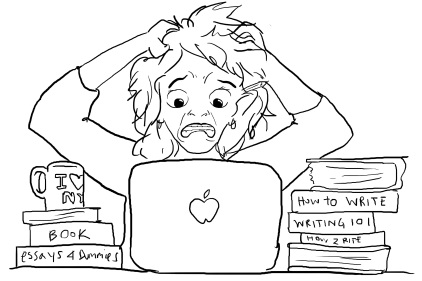Paper I Section II Composing… Otherwise known as “The Essay”
Teachers put a lot of emphasis on “The Essay”, and with good reason – the Composing question is worth 100 marks, quarter of the total for the exam and the highest marks available for any single question.
Students occasionally make the mistake of thinking that the essay requires less preparation than other parts of the exam because “you can’t study for it”. WRONG!!! This may have been the case for Junior Cert., but this is the big stage now and preparation is key. Your teacher will most likely have introduced you to the five categories of language way back at the beginning of 5th Year, and by now, you will have practised all of the main essay types.
You should also know which style suits you best (or at least which styles to avoid!!) but it’s important not to be limited by this – you might not normally write speeches, but the topic could be something you feel very passionate about and it would be a pity to have to avoid it just because you’re not too sure about structuring a speech.

The short story (normally two choices) is a very problematic option. In Junior cycle, the story tends to be the default option – anyone can make something up, after all. This is absolutely not the case for Leaving Cert., where the tasks are very specific and the standard required is very high. Unless you are very familiar with the short story genre and consistently get good marks, this option is best avoided.
Also PLEASE beware of learning off a short story (or any other type of essay), either your own or someone else’s, with a view to adapting it for the exam. IT WILL BE EASILY RECOGNISED for what it is by the Examiner, and you will be penalised under ‘P’ for lack of originality. Not to mention the possibility of plagiarism… I often relate the example of a former student of mine who wrote the ‘short story in which a mystery is solved’. It was a beautiful and well-written piece about a soldier’s experiences of war, but I waited and waited for the specified mystery. No sign of it, until the very last line, when the soldier suddenly found, under his bed, the shoe he had apparently been missing. Seriously??? This is the mystery??? No, no, no, no, no. The specific task must be CENTRAL TO THE STORY, not tagged on at the end or mentioned at the beginning and then forgotten.
The personal essay is another one which causes problems. THIS IS NOT A STORY. It should be a reflective piece in which you relate your response to the topic specified. You may use ANECDOTES, but only to illustrate your views. You are expected to write in your own voice, or at the very least, a voice that could be your own. You cannot write as the CEO of a Fortune500 company, or the mother/father of six grown-up children, unless you are (or could believably be) that person. I always advise my students to avoid any type of persona, and only chose this option if the topic is of genuine interest to them.
Here’s a brief summary I give to my own students in relation to the essay:
- Choose essay title carefully, reading exactly what you are asked to do – underline the key points
- If there is a quote, take careful note of whether you are directed to use/be inspired by the quote or not (generally NOT)
- PLAN carefully – spider diagram, mind map, paragraph plan – whatever format suits you but plan is vital to maintain coherence
- If you are torn between several options, write a brief plan for each. This will show you whether you have enough material.
- Main categories: Personal essay, descriptive essay, short story, newspaper/magazine/website article, opinion piece, debate, speech, argument, persuasive piece. Be aware of which style suits you best, but don’t be bound by that.
- Awareness of audience vital
- Personal essay – NOT A STORY. You may use anecdotes but the personal essay MUST BE REFLECTIVE (your thoughts, feelings and opinions) and should be true, honest and authentic – do not adopt a persona
- Article – As a reader, I should be aware that I am reading an article as opposed to any other prose style
- Be aware of the differences between a feature article, an opinion piece, a blog post etc. – read newspapers, magazines and blogs regularly (for research of course!)
- Debate – ensure that you are comfortable with the correct layout of a debate
- If you are asked to speak for or against a motion, you must come down firmly on the side you chose
- Try to include some refutation – answer the possible points which could be made by your opposition
- Speeches – not always debates
- Should always address the audience several times during the speech
- Try to use devices such as rhetorical questions – imagine you are actually making this speech
- Think quotes (have a stock selection), lists, power of three, anecdotes, statistics, etc.
- If you like speeches/debates, consider other options where you can utilise your discursive/persuasive talents – articles and personal essays may work for you depending on the title
- Avoid short story essays unless you write very good stories – a Junior Cert type story won’t work here
- If you do a short story, the specification outlined in the question should be CENTRAL to the story, not just mentioned at the beginning or tagged on at the end
- Descriptive essay – also NOT A STORY. Difficult to get the right balance between good descriptive language (adjectives, adverbs, images, metaphor, simile etc.) and over-the-top hyperbole. Also can be tough to sustain a descriptive piece over four pages, but again, if the style suits you and the topic is interesting, go for it.
- Essay should be minimum 4 ½ pages
Just two other things to remember: firstly, we all know that it is not an ideal situation to have to sit down and write four and a half pages or so on a topic you’ve only just seen under examination conditions. I wouldn’t like to do it!! What you hand up is essentially a first draft, and this will be taken into account in the marking process.
Secondly, choose your topic carefully – if YOU don’t find your essay interesting, neither will anyone else. A good essay is a joy to read, and yours can fall into that category.
Finally, if you are a 4th or 5th Year student reading this, the most important thing you can do to help yourself do well in the essay is to READ WIDELY (too late for that now for the 6th Years!).
As the prolific and very popular author, Stephen King, said in his memoir On Writing:
“If you want to be a writer, you must do two things above all others: read a lot and write a lot. There’s no way around these two things that I’m aware of, no shortcut.”
Best of luck!!
